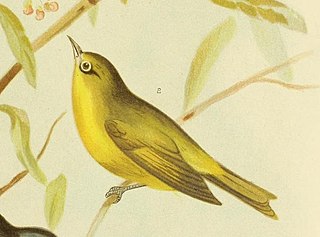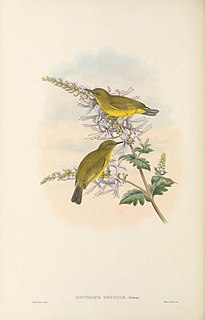
Zosterops is a genus of passerine birds containing the typical white-eyes in the white-eye family Zosteropidae. The genus has the largest number of species in the white-eye family. They occur in the Afrotropical, Indomalayan, and Australasian realms. Typical white-eyes have a length of between 8 and 15 cm. Their most characteristic feature is a conspicuous white feather ring around the eye, though some species lack it. The species in this group vary in the structural adaptations of the tongue. The Zosterops [griseotinctus] group is an example of a "great speciator" inhabiting a vast area and showing a remarkable morphological differentiation on islands, some of which maybe as close as 2 km (1.2 mi) apart.

The white-eyes are a family, Zosteropidae, of small passerine birds native to tropical, subtropical and temperate Sub-Saharan Africa, southern and eastern Asia, and Australasia. White-eyes inhabit most tropical islands in the Indian Ocean, the western Pacific Ocean, and the Gulf of Guinea. Discounting some widespread members of the genus Zosterops, most species are endemic to single islands or archipelagos. The silvereye, Zosterops lateralis, naturally colonised New Zealand, where it is known as the "wax-eye" or tauhou ("stranger"), from 1855. The silvereye has also been introduced to the Society Islands in French Polynesia, while the Japanese white-eye has been introduced to Hawaii.

The Indian white-eye, formerly the Oriental white-eye, is a small passerine bird in the white-eye family. It is a resident breeder in open woodland on the Indian subcontinent. They forage in small groups, feeding on nectar and small insects. They are easily identified by the distinctive white eye-ring and overall yellowish upperparts. The range previously extended eastwards to Southeast Asia, Indonesia and Malaysia but when the taxa in these regions were assigned to other species, the English name was changed.

The warbling white-eye, also known as the Japanese white-eye and mountain white-eye, is a small passerine bird in the white-eye family. The specific epithet is occasionally written japonica, but this is incorrect due to the gender of the genus. Its native range includes much of East Asia, including the Russian Far East, Japan, Indonesia, Korea, and the Philippines. It has been intentionally introduced to other parts of the world as a pet and as pest control, with mixed results. As one of the native species of the Japanese islands, it has been depicted in Japanese art on numerous occasions, and historically was kept as a cage bird.

The ashy-bellied white-eye is a species of bird in the family Zosteropidae found in the Lesser Sunda Islands and northern Cape York Peninsula. It is sometimes called the pale white-eye or pale-bellied white-eye, but should not be confused with the pale-bellied white-eye.

The Fiji white-eye is a species of passerine bird in the white-eye family Zosteropidae. The species is also known as Layard's white-eye. It is endemic to the islands of Viti Levu, Vanua Levu, Taveuni, Kadavu, and Ovalau in Fiji, where it is a common bird of forests. Where it co-occurs with the closely related silvereye it is more common in denser forest.

The capped white-eye is a species of bird in the family Zosteropidae. It is found in New Guinea. Its natural habitat is in subtropical or tropical moist montane forests. It has a white eye ring, round wings, and strong legs. The capped white-eyes are sociable and live in large flocks. The Oya Tabu white-eye of the D'Entrecasteaux Islands was formerly considered a subspecies, but is now thought to be a distinct species.

The Solomons white-eye or New Georgia white-eye is a species of bird in the family Zosteropidae. It is endemic to the New Georgia Islands in the Solomon Islands. It is also known as Zosterops rendovae but this name properly refers to the grey-throated white-eye.
The Gizo white-eye or yellow-billed white-eye is a species of bird in the family Zosteropidae.

The canary white-eye or yellow white-eye is a species of white-eye endemic to northern Australia in subtropical or tropical mangrove forests. Its common name reflects the circle of white feathers around its eye.

The Mayotte white-eye or chestnut-sided white-eye is a species of bird in the family Zosteropidae. It is now found only on Mayotte in the Comoro Islands. Its natural habitats are subtropical or tropical dry forests, subtropical or tropical moist lowland forests, and subtropical or tropical mangrove forests.
The Tagula white-eye or white-throated white-eye is a species of bird in the family Zosteropidae. It is endemic to Papua New Guinea.
The Karthala white-eye, also known as the Mount Karthala white-eye, Grand Comore white-eye, or Comoro white-eye, is a species of bird in the family Zosteropidae. As suggested by its name, it is endemic to Philippia heath woodland growing on Mount Karthala on the island of Grand Comore in the Comoros. Mount Karthala is an active volcano and future eruptions pose a serious threat to the Karthala white-eye. The bird is further threatened by human-induced habitat loss.

The Christmas white-eye is a species of bird in the family Zosteropidae. It is endemic to Christmas Island. Its natural habitats are Tropical and subtropical moist broadleaf forests and subtropical or tropical moist shrubland. It is threatened by habitat destruction.

The Papuan white-eye, sometimes known as the New Guinea white-eye, is a species of bird in the family Zosteropidae. It is found in the Aru Islands and New Guinea. Its natural habitats are subtropical or tropical moist lowland forests and subtropical or tropical moist montane forests. The species was first classified in 1878, and has a conservation status of Least Concern.

The olive-colored white-eye, also known as the olive white-eye, Yap olive white-eye or great Yap white-eye, is a species of bird in the family Zosteropidae.

The grey-throated white-eye is a species of bird. Its family, the Zosteropidae, is probably not valid and belongs in the Timaliidae instead. It is also known as Zosterops ugiensis because Z. rendovae has often been used for the Solomons white-eye.
The Ranongga white-eye or splendid white-eye is a species of bird in the family Zosteropidae. It is endemic to the Solomon Islands.

The robust white-eye, also known as the Lord Howe white-eye or robust silvereye and locally as the "big grinnell", was a species of bird in the family Zosteropidae. It was endemic to the lowland forests of Lord Howe Island, east of Australia.

The Togian white-eye is a species of bird in the family Zosteropidae.















